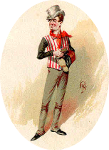Wellerisms

| No. of Players: | 1+ |
| Type of Game: | written or spoken |
| What you need: | pen & paper or nothing |
Goal
To think of funny explanations for clichés and proverbs.
How to play
Players challenge themselves or others to explain the origins of a cliché, proverb, idiom, or other common saying or phrase. Named after a character in Charles Dickens' novel The Pickwick Papers, the Wellerisms game can be played either verbally or with pen and paper. One player speaks or writes down a cliché, and the second player responds with a single line that explains how that cliché came to be. Players can compete to see who can come up with the most humorous explanation.
Examples
A group of players write down common sayings on pieces of paper and pass them to each other for completion. Here are the results of their efforts:
"An apple a day keeps the doctor away," Johnny smiled and thought, "especially if you aim right."
"A stitch in time saves nine," which is why cats have that many lives.
"Actions speak louder than words," said the man as he kicked around pots and pans.
"Head over heels in love," said the smitten breakdancer, as he spun on his head.
"Read between the lines," Bruce said to Tom, as he dropped the newspaper on the railroad tracks.
"Don't judge a book by its cover," said the infantryman, "it may not be able to shoot, but it could be a good read."
"The writing's on the wall," said the graffiti artist.
"Gut-wrenching pain," said the onlookers of the soldier committing harakiri.
"Heart-stopping fear" is what Bob felt just before his triple bypass surgery.
"Kiss and make up" usually ends in a smearing mess.
"The grass is always greener on the other side," said one earthworm to another.
Did you know?
It is well-known that wellerisms are named after Samuel Weller or his father – two characters created by Charles Dickens for his 1836–37 serial publication called The Pickwick Papers. Through these characters, Dickens makes fun of proverbs and other familiar sayings by taking them literally. What results is a brand of dry humor we now call the wellerism.

What is lesser-known is that The Pickwick Papers launched Dickens into international literary stardom at the young age of 24. More particularly, it was his use of wellerisms which did so. The first installment of Pickwick only sold about 500 copies. But after the introduction of the Sam Weller character in the fourth episode, the series became a smashing hit. It sparked Pickwick bootleg copies and theatrical performances before the series was even completed. It even spawned merchandise the growing fanbase could purchase, like Sam Weller joke books, songbooks, cigars, and china figurines. The special, double-length final installment of the series sold an impressive 40,000 copies.

It goes without saying that the prospects of Chapman and Hall – the publishing firm which took a chance on the previously unknown author – also rose with Dickens' newfound fame. We might well imagine the following scenario in their London office:
"That Charles Dickens certainly put us on the map," smiled Edward Chapman to his partner William Hall, as they stepped onto the atlas laying open on the floor.
Did you know?
The world's oldest surviving written text appears to be a set of proverbs. These Instructions of Shuruppak were engraved in cuneiform script on clay tablets and were given by the last king of Sumer to his son over 4,600 years ago.

Indeed they read like an older, wiser man imparting fatherly advice – and in two distinct directions. For instance, one is given practical warnings, like how not to locate a field on a road. But one is also given moral and philosophical advice, like how not to speak arrogantly to one's mother, how not to pass judgment when one drinks beer, and how "Fate is a wet bank; it can make one slip."

